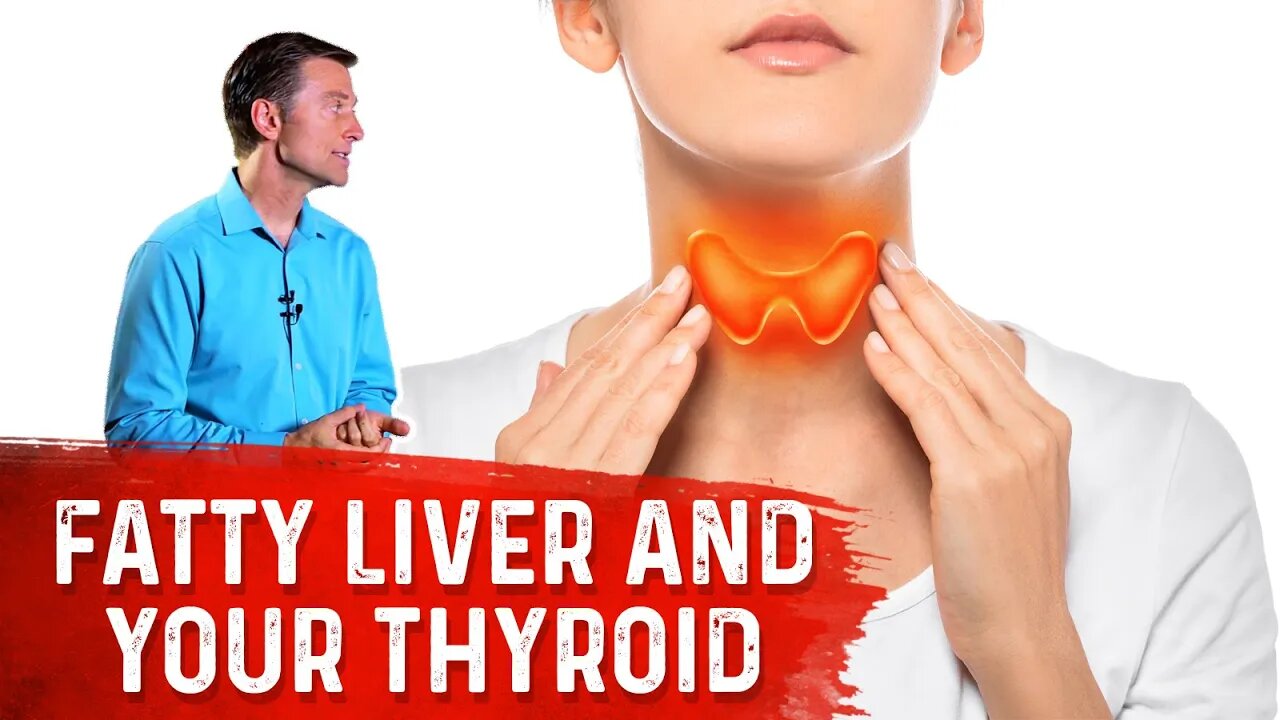Premium Only Content

Why Can A Fatty Liver Slow Your Thyroid (Hypothyroid)? – Dr. Berg
Find out about the surprising connection between fatty liver disease and thyroid function!
0:00 Introduction: Fatty liver and your thyroid
0:14 What causes a fatty liver?
0:29 Non-alcoholic fatty liver disease
1:02 Fatty liver signs
1:19 Cholesterol and decreased bile production
1:35 Fatty liver damage decreases thyroid function
2:15 How to reverse a fatty liver
2:35 More fatty liver remedies
In this video, we’re going to take a look at fatty liver disease and how it can potentially lead to a slow thyroid, also known as hypothyroidism.
Fatty liver disease can be caused by alcoholism, but it can also be caused by a diet rich in sugar and refined carbohydrates, with lots of frequent eating. This causes insulin spikes and can lead to insulin resistance.
These dietary choices lead to inflammation and scar tissue on the liver, eventually leading to a condition known as non-alcoholic fatty liver disease(NAFLD).
A large abdomen or gut is one of the most common fatty liver signs, but the best way to identify a fatty liver is through ultrasound.
A fatty liver diminishes your liver function causing your cholesterol to go up, and your bile production to go down. When you don’t have enough bile, you can’t effectively remove cholesterol.
The thyroid gland produces the hormone T4, which is converted to T3 in the liver. A fatty liver causes problems with the thyroid because the liver is unable to convert T4 into T3, the active form of the thyroid hormone.
If you cannot convert enough T4 to T3, you will develop hypothyroidism. When you have a slow thyroid, you build up even more cholesterol. Hypothyroidism also slows down your metabolism and causes weight gain.
Keto and intermittent fasting address the root cause of these issues by improving the symptoms of insulin resistance. You can also increase your intake of cruciferous vegetables and all other vegetables to help reverse a fatty liver over time.
Choline is very efficient at removing fat from the liver, and can be taken as a supplement to support fatty liver disease.
Dr. Eric Berg DC Bio:
Dr. Berg, age 57, is a chiropractor who specializes in Healthy Ketosis & Intermittent Fasting. He is the author of the best-selling book The Healthy Keto Plan, and is the Director of Dr. Berg Nutritionals. He no longer practices, but focuses on health education through social media.
Follow Me On Social Media:
Facebook: https://bit.ly/FB-DrBerg
Instagram: https://bit.ly/IG-DrBerg
Anchor: https://bit.ly/Anchor-DrBerg
TikTok: https://bit.ly/TikTok-DrBerg
Send a Message to his team: https://m.me/DrEricBerg
ABOUT DR. BERG: https://www.drberg.com/dr-eric-berg/bio
Disclaimer:
Dr. Eric Berg received his Doctor of Chiropractic degree from Palmer College of Chiropractic in 1988. His use of “doctor” or “Dr.” in relation to himself solely refers to that degree. Dr. Berg is a licensed chiropractor in Virginia, California, and Louisiana, but he no longer practices chiropractic in any state and does not see patients so he can focus on educating people as a full time activity, yet he maintains an active license. This video is for general informational purposes only. It should not be used to self-diagnose and it is not a substitute for a medical exam, cure, treatment, diagnosis, and prescription or recommendation. It does not create a doctor-patient relationship between Dr. Berg and you. You should not make any change in your health regimen or diet before first consulting a physician and obtaining a medical exam, diagnosis, and recommendation. Always seek the advice of a physician or other qualified health provider with any questions you may have regarding a medical condition.
#keto #ketodiet #weightloss #ketolifestyle
Thanks for watching. I hope you’ll try keto and intermittent fasting to help improve your fatty liver symptoms. I’ll see you in the next video.
-
 6:38
6:38
Dr. Eric Berg
6 days agoThe Shocking Truth About Vaccines
6.47K55 -
 LIVE
LIVE
Matt Kohrs
8 hours agoMarket Open Chaos: PCE Inflation Report & Payday Friday || Live Trading
777 watching -
 17:35
17:35
itsSeanDaniel
1 hour agoPro-Transgender Doctor HUMILIATED by Genius Conservative
8 -
 LIVE
LIVE
GritsGG
2 hours agoWin Streaking! Most Wins 3499+ 🧠
45 watching -
 LIVE
LIVE
Wendy Bell Radio
5 hours agoCrime is a 99/1 Issue
7,047 watching -
 1:07:12
1:07:12
Crypto Power Hour
3 hours ago $0.06 earnedBlockchain, The Fifth Evolution of Computing
1.92K6 -
 LIVE
LIVE
LFA TV
4 hours agoLFA TV ALL DAY STREAM - FRIDAY 8/29/25
3,802 watching -
 1:15:29
1:15:29
JULIE GREEN MINISTRIES
3 hours agoTHE GREAT WHITE WOLF NEXT TO YOUR PRESIDENT WILL SOON BE UNMASKED
59.4K184 -
 13:31
13:31
Adam Does Movies
20 hours ago $4.46 earnedAlien: Earth Episode 4 - Recrap
73.5K4 -
 9:02
9:02
Millionaire Mentor
19 hours agoCNN Host Left SPEECHLESS After Stephen Miller SHREDS Her Narrative
20.8K18